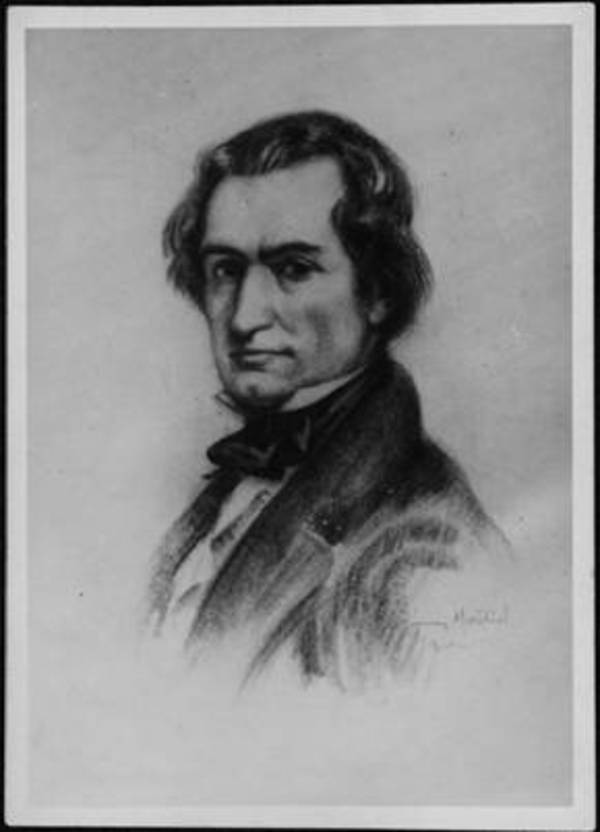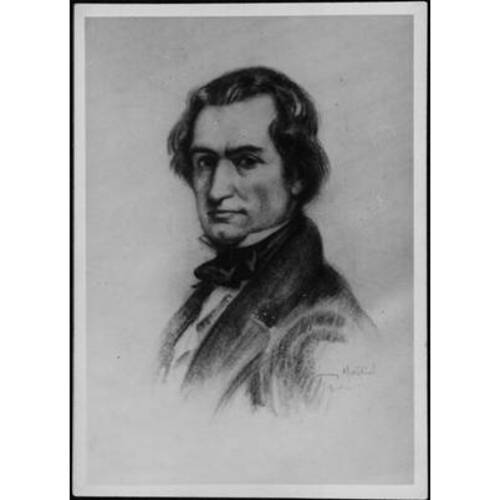
Source: Courtesy of Wikimedia Commons
PAPINEAU, DENIS-BENJAMIN, seigneurial agent, bookseller, seigneur, merchant, office holder, justice of the peace, and politician; b. 13 Nov. 1789 in Montreal, son of Joseph Papineau* and Rosalie Cherrier; m. there 14 Sept. 1813 Angélique-Louise Cornud, and they had nine children, including Denis-Emery; d. 20 Jan. 1854 in Sainte-Angélique (Papineauville), Lower Canada.
Denis-Benjamin Papineau, the fifth in a family of ten, five of whom died in infancy, studied from 1801 to 1807 at the Petit Séminaire de Québec, where his elder brother Louis-Joseph* was also a student from 1802 to 1804. In his letters to his family he often expressed a desire to go to the seigneury of Petite-Nation, a property his father had bought from the Séminaire de Québec. From 1808 the young man lived at Petite-Nation, serving as seigneurial agent in the absence of his father, who from 1809 to 1814 represented Montreal East in the House of Assembly. Denis-Benjamin had a wide variety of occupations, which included settling the first censitaires, clearing land, and building a manor-house and a sawmill. To judge by the letters exchanged between father and son, Denis-Benjamin often committed blunders and made bad deals. When Louis-Joseph bought the seigneury from his father in 1817, he entrusted its management to Denis-Benjamin, who looked after it until his brother returned from exile in 1845. During that period Denis-Benjamin’s particular concern was to increase the number of settlers and distribute lots. Lumbering was the chief economic activity. The sawmills were leased to local and regional lumberers, who were given cutting licences in return for paying rent. Papineau’s task was to see that the privileges granted were respected. He also collected the rents, and on this score he regularly had to face the remonstrances of his brother, who was dissatisfied with the receipts and criticized him for not being firm enough.
Denis-Benjamin did not, however, confine himself to his role as seigneurial agent. In 1818 and 1819 he was the partner of bookseller Hector Bossange, who had been running a bookstore on Rue Notre-Dame in Montreal for several years. Around 1825 he was active in Petite-Nation as a merchant and also as postmaster. In addition, he held commissions as justice of the peace for the district of Montreal in 1826, 1828, 1830, 1833, and 1837, and was a commissioner of roads and bridges in 1829 and 1830. He had become seigneur of Plaisance fief, at the southwest extremity of the seigneury of Petite-Nation, in 1822, but seven years later was obliged to sell part of his land because of financial difficulties. Subsequently he tried, in vain, to breed horses, but he did succeed with sheep-farming and in 1844 owned a flock of 200.
Like his father and his brother Louis-Joseph, Papineau was interested in politics. He represented Ottawa in the assembly from 17 Aug. 1842 to 6 Dec. 1847. From September 1844 to June 1846, he was a member of the administration of William Henry Draper* and Denis-Benjamin Viger*. He helped form a government with Draper in June 1846, and then one with Henry Sherwood in May 1847. He discharged the duties of executive councillor and of commissioner of crown lands from September 1844 to December 1847, as well as those of commissioner of public works from October 1844 to June 1846.
The stands Papineau took made him a controversial figure. While the majority of French Canadians, under the leadership of Louis-Hippolyte La Fontaine*, took the path leading to ministerial responsibility, Papineau, whose family ties and principles associated him with the reform party, accepted office from Governor Sir Charles Theophilus Metcalfe*. According to historian Louis-Philippe Turcotte*, Metcalfe considered he must bestow ministerial appointments on persons he could fully trust. In appointing Papineau and his cousin Denis-Benjamin Viger, the governor sought to rally around him men whose very names would reassure French Canadians of the government’s desire to serve their interests as best it could, especially since he felt sure that the people in general and a majority in the house were opposed to his views. In the opinion of historian Thomas Chapais*, Papineau, by accepting a post under Metcalfe, created dissension in the reform party; in Louis-Joseph Papineau’s view, “One cannot accept a position as minister and remain an honourable man.” For historian Jacques Monet, however, Denis-Benjamin’s decision to accept a seat on the Executive Council was the best approach for him to have adopted in light of his personal principles: his behaviour implied a spirit devoted to the French Canadian cause.
Papineau’s first act as a member of the assembly was to help choose a speaker for the house. According to Turcotte and Chapais, he committed a blunder in voting for Sir Allan Napier MacNab*, a unilingual anglophone, a decision that antagonized the Lower Canadian reform majority. In December 1844 he drew a positive response from the opposition when he moved approval of an address to the queen to annul the clause of the Act of Union which prohibited the use of the French language in legislative documents. For Turcotte, this step served to redeem to some extent his vote in favour of MacNab and to improve his image in the eyes of his compatriots. For Chapais, it was a political manœuvre: the Executive Council had anticipated that the reform party would make a resolution of this kind and decided to forestall it by taking the initiative itself through Papineau.
During his term as a minister Papineau again made his voice heard in ways that drew criticism from the opposition. He justified the government’s action in 1845 in approving the grant of a substantial sum to compensate those in Upper Canada who had incurred losses during the rebellion of 1837–38, whereas nothing similar was granted in Lower Canada. The following year he also defended the government’s intention to use for educational purposes the revenue from the Jesuit estates, as well as its proposal to make the expenses of administering criminal justice in Upper Canada a charge upon the consolidated revenue fund. These laws, which aroused violent opposition, were enough to make him thoroughly unpopular.
Papineau introduced in the assembly two important and highly controversial bills concerning schools and municipal administration in Lower Canada. The new school act passed in 1845 entrusted to school boards the management of public schools and the responsibility for collecting funds to operate them efficiently. For the Catholic clergy this legislation smacked of injustice. Fearful of losing control of education, the priests claimed their rights through a member of the opposition, Augustin-Norbert Morin*. Heated discussions led Papineau to accept in 1846 amendments favourable to the clergy, but not before he had held his ground and again incurred the censure of the opposition and the general public. As for the act dealing with municipalities in Lower Canada, passed during the same 1845 session, it replaced the old organization based on districts with an administration founded on parishes. It satisfied the opposition in principle, but the assessment rates, as in the case of the school act, were discussed for a long time and subsequently amended.
Papineau’s short political career ended during the governorship of Lord Elgin [Bruce*]; influenced by Viger’s resignation the previous year, Papineau gave up his duties in 1847. He retired to Plaisance fief, where he remained, embittered by illness, until his death. Historians generally agree that Denis-Benjamin Papineau played a minor role as a politician. Though he provoked controversy in this capacity, he seems more important as a seigneur and seigneurial agent.
ANQ-Q, P-417. ASQ, Fichier des anciens. PAC, MG 24, B2; RG 68, General index, 1651–1841: 200–1, 256, 358, 363, 368, 375, 383, 641, 697; 1841–67: 40, 73, 89, 91. Julie Bruneau, “Correspondance de Julie Bruneau (1823–1862),” Fernand Ouellet, édit., ANQ Rapport, 1957–59: 59–184. Debates of the Legislative Assembly of United Canada (Abbott Gibbs et al.), vol.4. L.-J. Papineau, “Correspondance de Louis-Joseph Papineau (1820–1839),” Fernand Ouellet, édit., ANQ Rapport, 1953–55: 191–442; 1955–57: 255–375. Joseph Papineau, “Correspondance de Joseph Papineau (1793–1840),” Fernand Ouellet, édit., ANQ Rapport, 1951–53: 169–299. F.-J. Audet, “Les législateurs du Bas-Canada.” L.-O. David, Biographies et portraits (Montréal, 1876). Desjardins, Guide parl. Claude Baribeau, La seigneurie de la Petite-Nation, 1801–1854; le rôle économique et social du seigneur (Hull, Qué., 1983). Chapais, Cours d’hist. du Canada, vols.5–6. L.-O. David, L’union des deux Canada, 1841–1867 (Montréal, 1898). Monet, Last cannon shot. J.-L. Roy, Édouard-Raymond Fabre, 57. Rumilly, Papineau et son temps. L.-P. Turcotte, Le Canada sous l’Union, 1841–1867 (2v., Québec, 1871–72). [R.] C. Harris, “Of poverty and helplessness in Petite-Nation,” CHR, 52 (1971): 23–50. É.-Z. Massicotte, “Les deux premiers avocats Bibaud,” BRH, 44 (1938): 340–43. D.-B. Papineau, “Samuel Papineau,” BRH, 39 (1933): 331–46.
Cite This Article
Claude Baribeau, “PAPINEAU, DENIS-BENJAMIN,” in Dictionary of Canadian Biography, vol. 8, University of Toronto/Université Laval, 2003–, accessed February 25, 2026, https://www.biographi.ca/en/bio/papineau_denis_benjamin_8E.html.
The citation above shows the format for footnotes and endnotes according to the Chicago manual of style (16th edition). Information to be used in other citation formats:
| Permalink: | https://www.biographi.ca/en/bio/papineau_denis_benjamin_8E.html |
| Author of Article: | Claude Baribeau |
| Title of Article: | PAPINEAU, DENIS-BENJAMIN |
| Publication Name: | Dictionary of Canadian Biography, vol. 8 |
| Publisher: | University of Toronto/Université Laval |
| Year of publication: | 1985 |
| Year of revision: | 1985 |
| Access Date: | February 25, 2026 |



